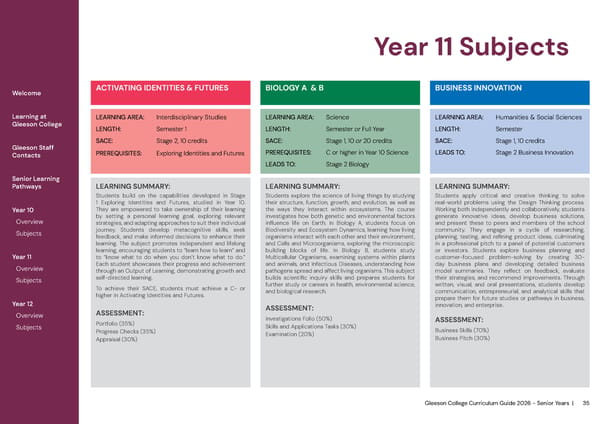Gleeson College Curriculum Guide 2026 - Senior Years | 35 Year 11 Subjects Welcome Learning at Gleeson College Gleeson Staff Contacts Senior Learning Pathways Year 10 Overview Subjects Year 11 Overview Subjects Year 12 Overview Subjects LEARNING SUMMARY: Students build on the capabilities developed in Stage 1 Exploring Identities and Futures, studied in Year 10. They are empowered to take ownership of their learning by setting a personal learning goal, exploring relevant strategies, and adapting approaches to suit their individual journey. Students develop metacognitive skills, seek feedback, and make informed decisions to enhance their learning. The subject promotes independent and lifelong learning, encouraging students to “learn how to learn” and to “know what to do when you don’t know what to do.” Each student showcases their progress and achievement through an Output of Learning, demonstrating growth and self-directed learning. To achieve their SACE, students must achieve a C- or higher in Activating Identities and Futures. ASSESSMENT: Portfolio (35%) Progress Checks (35%) Appraisal (30%) ACTIVATING IDENTITIES & FUTURES LEARNING AREA: Interdisciplinary Studies LENGTH: Semester 1 SACE: Stage 2, 10 credits PREREQUISITES: Exploring Identities and Futures BIOLOGY A & B LEARNING AREA: Science LENGTH: Semester or Full Year SACE: Stage 1, 10 or 20 credits PREREQUISITES: C or higher in Year 10 Science LEADS TO: Stage 2 Biology LEARNING SUMMARY: Students explore the science of living things by studying their structure, function, growth, and evolution, as well as the ways they interact within ecosystems. The course investigates how both genetic and environmental factors influence life on Earth. In Biology A, students focus on Biodiversity and Ecosystem Dynamics, learning how living organisms interact with each other and their environment, and Cells and Microorganisms, exploring the microscopic building blocks of life. In Biology B, students study Multicellular Organisms, examining systems within plants and animals, and Infectious Diseases, understanding how pathogens spread and affect living organisms. This subject builds scientific inquiry skills and prepares students for further study or careers in health, environmental science, and biological research. ASSESSMENT: Investigations Folio (50%) Skills and Applications Tasks (30%) Examination (20%) BUSINESS INNOVATION LEARNING AREA: Humanities & Social Sciences LENGTH: Semester SACE: Stage 1, 10 credits LEADS TO: Stage 2 Business Innovation LEARNING SUMMARY: Students apply critical and creative thinking to solve real-world problems using the Design Thinking process. Working both independently and collaboratively, students generate innovative ideas, develop business solutions, and present these to peers and members of the school community. They engage in a cycle of researching, planning, testing, and refining product ideas, culminating in a professional pitch to a panel of potential customers or investors. Students explore business planning and customer-focused problem-solving by creating 30- day business plans and developing detailed business model summaries. They reflect on feedback, evaluate their strategies, and recommend improvements. Through written, visual, and oral presentations, students develop communication, entrepreneurial, and analytical skills that prepare them for future studies or pathways in business, innovation, and enterprise. ASSESSMENT: Business Skills (70%) Business Pitch (30%)
 2026 Gleeson College Senior Years Curriculum Guide 2026 Page 34 Page 36
2026 Gleeson College Senior Years Curriculum Guide 2026 Page 34 Page 36